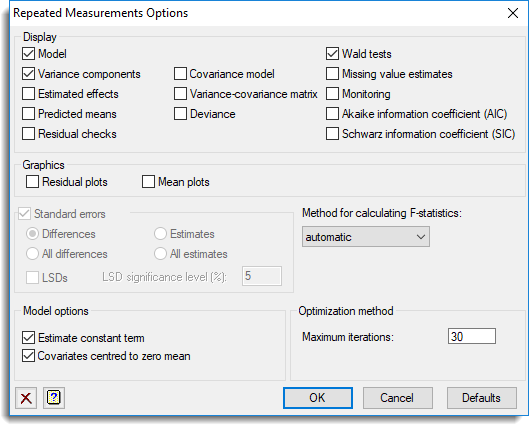Selects information to be printed by the analysis and controls certain aspects of the method used.

Display
This specifies which items of output are to be produced by the analysis.
| Model | Description of the model fitted by the analysis |
| Variance components | Estimates of variance parameters |
| Estimated effects | Estimates of regression coefficients |
| Predicted means | Predicted means |
| Residual checks | Uses the VCHECK procedure to check the residuals for outliers and variance stability |
| Stratum variances | Estimates of approximate stratum variances |
| Covariance model | Estimated covariance models in matrix format |
| Variance-covariance matrix | Variance-covariance matrix for the variance parameters |
| Deviance | The residual deviance |
| Wald tests | Wald tests for fixed model terms and accompanying F-statistics (if selected) |
| Missing value estimates | Estimates of values missing from the input |
| Monitoring | Monitoring information at each iteration |
| Akaike information coefficient (AIC) | Akaike information coefficient to assess the random model |
| Schwarz information coefficient (SIC) | Schwarz information coefficient to assess the random model |
Standard errors
Tables of means and effects are accompanied by estimates of standard errors. You can choose whether Genstat computes standard errors or standard errors of differences (SEDs) for the tables.
Method for calculating F-statistics
This controls whether Wald tests for fixed effects are accompanied with approximate F statistics and corresponding numbers of residual degrees of freedom. The computations, using the method devised by Kenward & Roger (1997), can be time consuming with large or complicated models. So, the default setting automatic, can be used to allow Genstat to assess the model itself and decide automatically whether to do the computations and which method to use. The other settings allow you to control what to do yourself:
| none | No F statistics are produced |
| algebraic | F statistics are calculated using algebraic derivatives (which may involve large matrix calculations) |
| numerical | F statistics are calculated using numerical derivatives (which require an extra evaluation of the mixed model equations for every variance parameter). |
Estimate constant term
Specifies whether a constant term is included in the fixed model.
Covariates centred to zero mean
Specifies whether covariates are centred to zero mean during the analysis. This applies to all covariates in the model. If covariates are centred, tables of predicted means are based on the mean covariate value, otherwise zero for each covariate.
Maximum iterations
This specifies the maximum number of iterations to use to optimize the REML likelihood.
See also
- Repeated Measures Data in Parallel menu.
- Further Output for obtaining additional output after fitting a model.
- Save for saving the results from a REML analysis.
- Linear Mixed Models (REML) menu.
- Initial Values for specifying initial gamma.
- Save REML results in a spreadsheet.
- Residual Plots for generating plots of residuals.
- Means Plots for generating plots of one- or two-way tables of means.
- REML directive for command mode use of REML, with additional options to
control the algorithm and for more sophisticated analyses. - VCOMPONENTS directive for further information about
fixed, random, and spline model terms. - REML Predictions menu for forming predictions.
- VCHECK procedure to check the residuals.